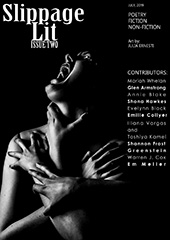New Lit on the Block :: Emerge Literary Journal
Editor Ariana D. Den Bleyker is the driving force behind Emerge Literary Journal, a publication of poetry available quarterly online and biannually in print. Each issue features all new poetry, with the print issues showcasing the “best” material accepted throughout the preceding reading period. Copies of the print issue will be made available through Lulu.
Emerge is aptly named, as Bleyker notes the publication is “dedicated to emerging poets and their words. We aim to publish poets who are currently emerging on the literary scene. We recognize how hard it can be to get those first few publishing credits and hope to be a foundation for the poets seeking to be published here.”
As such, Bleyker offers readers “outstanding, fresh writing from some never before published voices and other emerging writers that may have some publications under their belt with a few established writers sprinkled in between.”
Having just released the second issue, contributors include Kevin Ridgeway, Jennifer Schmitz, Cameron LaFlam, Bryony Noble, Coop Lee, Simon Rhee, Samantha Duncan, Stephen Byrne, Josh Crummer, Robert Cantrell, Zachariah Middleton, Christina Murphy, Nels Hanson, Chloe Clark, Sara Krasnostein, Craig Getz, Athena Dixon, Cody Jensen, Dan Nowak, Steven Myers-Yawnick, Anthony Frame, Jodie Oakes, Aftab Shaikh, Thomas Stevenson, Jordan Taylor, Kyrie Amos, Ricky Garni, SK Iyer, Michelle Hartman, Ann Howells, Vishnu Rajamanickam, Don Illich, Allie Marini Batts, Ruth Quinlin, Danna Hobart, John Kazlauskas, Taylor Pangman, Sarah O’Toole, and James Piatt.
Emerge Literary Journal currently accepts poetry, with a preference for free verse: “words with passion, voice, and place. We look for images that linger, that we can take with us to bed at night, ideas used in magnificent ways. Bring us your castles.” All submissions are accepted through Submittable only, and guidelines can be found on the publication’s website.
Bleyker plans to open the publication up to flash fiction (up to 750 words) by the next reading period, with a limit of four stories per issue.


